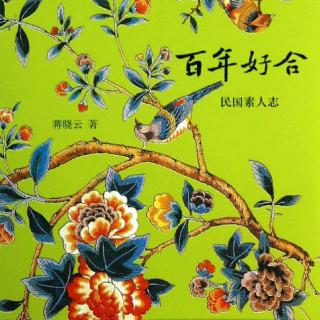
介绍:
English novelist Charles Dickens once described the French Revolution as: it was the best of times, it was the worst of times.
The same metaphor could also apply to the Republican Era of China, which dated from 1912 to 1949.
During that dynamic and eventful age, wars and turbulence plagued the nation; yet at the same time, the tradition of old China clashed and interwove with the ideas of the West; and a wealth of talents came forth to make their marks throughout the history.
But instead of spilling ink over those noted and powerful, Taiwan-born author Jiang Xiaoyun takes a strong interest in women of that time.
"Compared with men, it is easier to write about women. Their world is smaller. During that period, life was hard for women, even for those educated ones. Since women had less job opportunities, they were most likely to be dependent on men, especially in wartime. "
So in her novel, Love for All Season, "Bai Nian Hao He"in Chinese, Jiang compiles twelve stories that focus on women who were all born during the Republican Era. No matter they are blue bloods born with a silver spoon, or women living at the bottom of the society, all the characters are diaspora who are at the mercy of fate and forced to leave the mainland during that troubled age. Written in a placid style, the author unravels the thrilling vicissitudes of love, the heart-wrenching fickleness of human relations, and the struggle of common people in the crevice of the war-rocked times.
Her elaborately crafted plot and focus on female perspective do remind people of Eileen Chang, who was known for her lyrical illustration of romance and conflict during the 1940s.
But book critic Xiao Bao voices his retort.
"Generally speaking, these two writers are different in a very fundamental way. Eileen Chang was a tragic genius. Her style was dismal and she was ruthless to her characters. But Jiang Xiaoyun is a winner in life. Her stories are all about minor pathos, worthless joy and unideal reunion. Compared with Eileen Chang, she shows tenderness in her writings, which is utterly different. "
Jiang's characters seem to be stronger. In her stories, we meet Shang Shuying, a nightclub dancer who is itinerant all her life depending on different men but eventually becomes a successful businesswoman all by herself, and An Jing, a fiddling daughter of the family who finds sanctuary through marriage and religion.
The writer summarizes the women she wrote.
"Some people ask me, how could these women still carry on and live on, after abandoning all their wealth and face the break-up of their families? I think first of all, these women are equipped with certain skills to support themselves. And most importantly,they have something to hold on to. In my stories, I didn't demonstrate the upheaval of the time by describing the taste of hunger. My characters suffer as well. But no matter how worn-out they are, they will put a bundle of flower on their table. I want to write people like that. "
Although at the first glance, the twelve stories in the book seem to be irrelevant and haphazard, the more you read, the more likely you will be surprised by the length and breadth of the fiction, as it spans over the course of one century and cross continents. From Shanghai, Hong Kong to Taipei and New York, readers not only trace the migratory routes of these characters, but also outline the shape of the past and learn how it shadows or illuminates the present.
According to book critic Xiao Bao, the extensive use of various Chinese dialects and meticulous depiction on the minutiae of daily life, making "Love for All Seasons" an enjoyable reading.
"Writing novel requires imagination. But people tend to forget that observation is equally important. Ms Jiang brings the Republican Era back to life. Her keen observation, combined with rich imagination and beautiful literary expressions evoke readers' curiosity about that period. "
From 2011, Jiang Xiaoyun has launched a writing project, which will cover 38 women born during the Republican Era.
大家还在听

